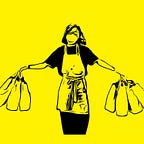Alessandro, Baker, New York
By Jonathan Zwickel
Shift Change tells the stories of ordinary people on the frontlines during a transformational period in American life. The goal of this project is to raise funds for Supply Drop Brooklyn, a charitable organization that partners with local restaurants to deliver meals to healthcare workers at affected hospitals. Your help can make a critical difference. Please visit Supply Drop and learn how you can make a contribution. For more information about this project, check out our About page.
Alessandro is a baker in New York. This is his story.
How long have you been a baker?
All my life. I grew up in Rome and I come from three generations of bakers. My parents and grandparents were pastry bakers and we owned a family business. In 2000, when I decided to discover different things, I moved to Philadelphia. A company hired me from Italy to help open a pastry shop. I stayed with them for two years then moved to New York and pretty soon I started working at Tarallucci e Vino.
How has your work changed since the pandemic began?
It’s changed a lot. I used to have all my team at the bakery helping me out to make all the food for the frontline, [but now] the schedule is not stable. I’m working seven days [a week] because we need to adapt our bakery — it wasn’t built to make a big production of bread. We have to make bread for 1,000 meals a day to make panini and everything else. Before, I made dessert, croissants, special bread, but never this amount of bread.
And it takes very long, because the oven is only fit for a small amount of bread. So, now our shifts are extended. On top of that, I do the delivery. I bake our brunch croissants for the field hospital in Central Park, then I do the delivery at 6 a.m. for them to have energy to work throughout the day.
So you’re working 12-hour days, 7 days a week?
I start at 6 p.m. and finish the delivery at 6 a.m. It’s hard. Especially seven days. But it’s a pleasure, because I know it’s for a good cause. Everybody needs someone to help, especially now when people are feeling helpless. I’m sure I’m not the only one.
So your bakery wasn’t cut out for this kind of volume.
Pretty much. It’s small so it takes a long time to bake. Plus, we need to make pastry and croissants for our other locations that are open for delivery. We also make 1,000 cookies a day to put in the meals that we deliver.
How has the quarantine affected your life?
For me, [after] I’ve been here 12 hours, sometimes I make the decision to not see my kids or family. Because even if I’ve used all the safety gear by going to the hospital I’m exposed more, sometimes I feel like I should stay away and maintain safety for the family. I’ll stay with people that work with me. Not all the time, but a few times to lower the risk. But it’s for a good cause. The more everybody does this, the less we need to stay in this situation.
How has your baking changed?
I guess practice makes you better! When I grew up, I was a baker, then I became a pastry chef. Now I’m having flashbacks to when I worked with my father and the family making bread.
How is your family in Italy?
That’s a different story. They are more strict than us. Fortunately, my family is OK but they’re very scared and they’re locked down like us. People are still walking around with masks, but in Italy you need to have a permit to go around. My brother owns a bakery in Rome so he has permission to go out at a certain time to make bread. Other than that, it’s pretty rough. And my mom doesn’t go outside because she’s a little older. Pretty scary, but they’re still there and doing their thing.
Have you heard of people “stress baking”?
Definitely. A friend in Italy sent me pictures of their bread. “Look what I made today!” There’s another one that says, “I can’t find yeast now. Do you know how to make yeast from flour?” And I tell them the trick is how to make sourdough work as a natural yeast.
What are your hopes for the future?
I’m very positive about the future. I can see people value their life more and better job opportunities, because through a hard time is when we get better. But at the beginning, it’s a very hard point for anything and everybody. It’s like coming out of a cave and seeing a different lifestyle, a different world. That’s what I see now. Nobody knows where to start or where to go. Pretty soon everybody will go back to their normal life, but with a little scar on it.
What have you been reading or listening to to help you through?
I’m reading a book called Built to Serve. This is the right moment to read this book, to spend the rest of my 12 hours after working to help relax me. It’s about how to find yourself, what you like, and how to pursue what you like.
Have you figured out what you like?
For now, I like making bread, serving as many meals as possible, and making sure everybody in the hospital has enough. Who knows when I’ll finish the book.
